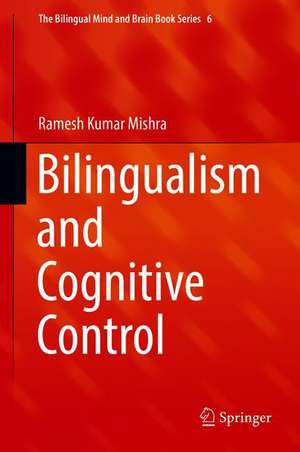Bilingualism and Cognitive Control: The Bilingual Mind and Brain Book Series, cartea 6
Autor Ramesh Kumar Mishraen Limba Engleză Hardback – 31 iul 2018
Included in the coverage:
- The evolution of bilingualism.
- What goes on in a bilingual mind? The core cognitive mechanisms.
- Cognitive advantage ofbilingualism and its criticisms.
- Neuroscience of bilingualism.
- Bilingualism, context, and control.
- Attention, vision, and control in bilinguals.
| Toate formatele și edițiile | Preț | Express |
|---|---|---|
| Paperback (1) | 492.87 lei 22-36 zile | +14.95 lei 5-11 zile |
| Springer International Publishing – 21 dec 2018 | 492.87 lei 22-36 zile | +14.95 lei 5-11 zile |
| Hardback (1) | 698.30 lei 43-57 zile | |
| Springer International Publishing – 31 iul 2018 | 698.30 lei 43-57 zile |
Preț: 698.30 lei
Preț vechi: 821.53 lei
-15% Nou
Puncte Express: 1047
Preț estimativ în valută:
133.62€ • 139.88$ • 110.56£
133.62€ • 139.88$ • 110.56£
Carte tipărită la comandă
Livrare economică 07-21 aprilie
Preluare comenzi: 021 569.72.76
Specificații
ISBN-13: 9783319925127
ISBN-10: 3319925121
Pagini: 150
Ilustrații: XIII, 185 p. 30 illus., 24 illus. in color.
Dimensiuni: 155 x 235 mm
Greutate: 0.46 kg
Ediția:1st ed. 2018
Editura: Springer International Publishing
Colecția Springer
Seria The Bilingual Mind and Brain Book Series
Locul publicării:Cham, Switzerland
ISBN-10: 3319925121
Pagini: 150
Ilustrații: XIII, 185 p. 30 illus., 24 illus. in color.
Dimensiuni: 155 x 235 mm
Greutate: 0.46 kg
Ediția:1st ed. 2018
Editura: Springer International Publishing
Colecția Springer
Seria The Bilingual Mind and Brain Book Series
Locul publicării:Cham, Switzerland
Cuprins
Chapter 1: Introduction.- Chapter 2: The Evolution of Bilingualism.- Chapter 3: What Goes On in a Bilingual Mind? The Core Cognitive Mechanisms.- Chapter 4: Cognitive Advantage of Bilingualism and its Criticisms.- Chapter 5: Neuroscience of Bilingualism.- Chapter 6: Bilingualism, Context, and Control.- Chapter 7: Attention, Vision, and Control in Bilinguals.- Chapter 8: Conclusion.
Notă biografică
Ramesh Kumar Mishra is a cognitive scientist and chair of the Center for Neural and Cognitive Sciences, University of Hyderabad, a major research university of India. He has published widely in the areas of attention, visual processing, bilingualism and language processing. He has also published on literacy and its influence on cognition. He has edited or authored three books (Mishra, 2015; Mishra, Huettig, & Srinivasan, 2015; Mishra & Srinivasan, 2011) so far in the area of language-vision interaction. He is also an editorial board member of Bilingualism: Language and Cognition. His dual expertise in cognitive psychology (attention, vision and executive control) and psycholinguistics of bilingualism (language non-selective activation, visual world eye tracking) helps him to explore in-depth the cognitive science angle to the bilingual advantage effect. He is the Editor-in-Chief of the International Journal of Cultural Cognitive Science (Springer) and is a fellow of the Psychonomic Society.
Textul de pe ultima copertă
This thought-provoking monograph makes a multidisciplinary case for bilingualism as a possible enhancer of executive function, particularly cognitive control. Its central focus is the cognitive operations of the bilingual brain in processing two languages and whether they afford the brain a greater edge on neuroplasticity—in short, a cognitive advantage. Major issues and controversies in the debate are analyzed from cognitive neuroscience, psycholinguistic, and integrative perspectives, with attention paid to commonly and rarely studied domains at work in bilingual processing. And the author pinpoints future areas for improved research such as recognizing the diversity of bilingualism, not simply in languages spoken but also in social context, as seen among immigrants and refugees.
Included in the coverage:
Included in the coverage:
- The evolution of bilingualism.
- What goes on in a bilingual mind? The core cognitive mechanisms.
- Cognitive advantage of bilingualism and its criticisms.
- Neuroscience of bilingualism.
- Bilingualism, context, and control.
- Attention, vision, and control in bilinguals.
Caracteristici
Provides a critical and objective analysis of important issues related to the influence of bilingualism on cognitive control Includes in-depth coverage from important disciplines such psycholinguistics, cognitive psychology and cognitive neuroscience Present and reviews data from both linguistic and non-linguistic domains






